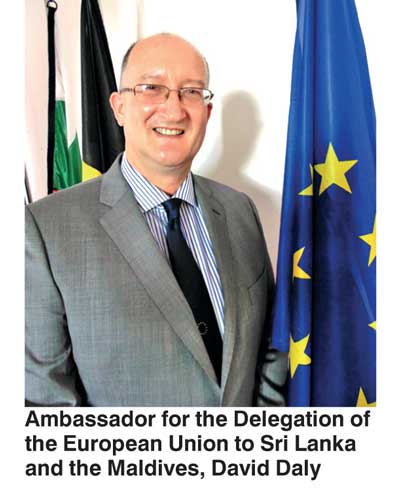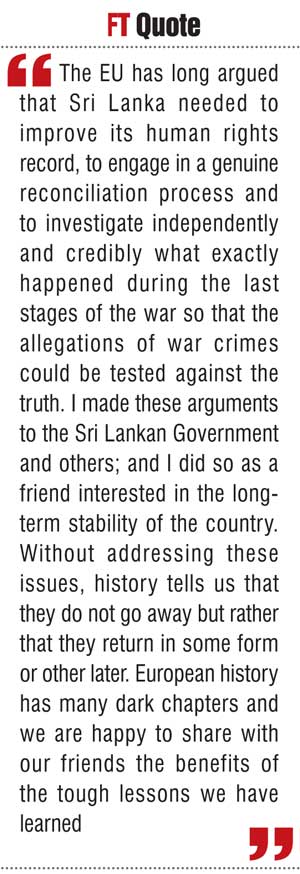Thursday Feb 26, 2026
Thursday Feb 26, 2026
Wednesday, 24 August 2016 00:02 - - {{hitsCtrl.values.hits}}
 The Ambassador for the Delegation of the European Union to Sri Lanka and the Maldives, David Daly, upon completing his tour of duty in Sri Lanka, congratulated the Government on creating an Office of Missing Persons and stressed the importance of genuine reconciliation in his valedictory message.
The Ambassador for the Delegation of the European Union to Sri Lanka and the Maldives, David Daly, upon completing his tour of duty in Sri Lanka, congratulated the Government on creating an Office of Missing Persons and stressed the importance of genuine reconciliation in his valedictory message.
The following is his full statement.
When you read this I will already have left Sri Lanka. I take up my new duties at the European Union headquarters in Brussels on 1 September 2016.
When I came here in September 2013, Sri Lanka was preparing to host the Commonwealth Heads of Government Meeting (CHOGM). Colombo was in a deep state of beautification. Even if hosting CHOGM was the catalyst, we all enjoyed the fruits of the improvements afterwards; the racecourse complex, Independence arcade, better streets and a cleaner Colombo. It all looked great. CHOGM also showed what Sri Lanka was capable of.
However, Colombo is not Sri Lanka and the visible surface is not the complete reality. When I travelled to the north and east of Sri Lanka in the early days I saw a different reality; poverty, destruction, the legacy of war. I was proud to visit EU funded projects which brought regeneration to fishermen and farmers, to villages and their schools and to ordinary people, very many of them women, trying to rebuild lives destroyed by the war and its aftermath - the horror of knowing nothing about their missing husband, son or daughter. The pain of simply not knowing. I congratulate the Government on the Office of Missing Persons.
Our development work is evolving and our latest programs are in the Central and Uva provinces. The EU has long argued that Sri Lanka needed to improve its human rights record, to engage in a genuine reconciliation process and to investigate independently and credibly what exactly happened during the last stages of the war so that the allegations of war crimes could be tested against the truth.
 I made these arguments to the Sri Lankan Government and others; and I did so as a friend interested in the long-term stability of the country. Without addressing these issues, history tells us that they do not go away but rather that they return in some form or other later. European history has many dark chapters and we are happy to share with our friends the benefits of the tough lessons we have learned.
I made these arguments to the Sri Lankan Government and others; and I did so as a friend interested in the long-term stability of the country. Without addressing these issues, history tells us that they do not go away but rather that they return in some form or other later. European history has many dark chapters and we are happy to share with our friends the benefits of the tough lessons we have learned.
Often I was met with denial and the criticism that I could not understand because I was a foreigner; also, that I was trying to foist Western concepts on an Asian culture.
Yes, I am a foreigner in Sri Lanka and I cannot see and feel as a Sri Lankan. But that does not mean that if the underlying factors which caused the war remained unaddressed that the issues would simply disappear; or, that I should expect the rule of law to pertain to me because I am an Irishman and a European, but that if I were a Sri Lankan I should somehow expect lower standards. Why should I? Why should Sri Lankans?
The election of President Sirisena was a watershed for Sri Lanka and for my diplomatic posting here. His priorities of good governance, improved rule of law and a genuine reconciliation process were what a majority of Sri Lankans voted for.
The EU is helping Sri Lanka on these issues and is bringing on stream new financial support to these ends. My successor, Tung-Lai Margue, will have the privilege of inaugurating the programs to support short-term needs and long-term reconciliation which the Delegation is already working on with the Government, the wider international community and Sri Lankan civil society.
I was very pleased that Sri Lanka was able to make the necessary progress that enabled the EU to lift its IUU fisheries ban. Being able to export fish to Europe means all those in the fishing industry - from the fishermen up - receiving more money for the work that they do. And the controls and regulations that have been put in place help protect their livelihoods going into the future.
The GSP+ is another major issue on which a lot of progress has been made; this progress, and more, must continue so that Sri Lanka can convince my colleagues in Brussels, the Council of the Member States and the European Parliament that the progress on human rights and the implementation of the international conventions that Sri Lanka has signed are irreversible.
Both the IUU and the GSP+ have helped us to work more closely together.
The EU-Sri Lanka Joint Commission in Brussels in July registered great progress across the wide range of issues of our engagement. In December 2013 when we held the Joint Commission in Brussels, it was the first such meeting after a hiatus of five years. Now we are back on track in working together in a more open and frank manner. This matters. Working closely with the European Union sends a message to others that Sri Lanka is making progress. Investors take note of such things.
Naturally, one of the issues we discuss is exactly trade and investment; how to attract more investment and to eliminate trade and investment barriers. This always needs more work.
When people ask me about Sri Lanka I describe it as a country with enormous potential. To unleash the full range of this potential it is necessary to show progress on the governance and rule of law issues as well as to engage in a genuine reconciliation process.
The world is watching transition in Sri Lanka and wishes it well; not just the UN Human Rights Council, but also investors and others.
Most of all, Sri Lankans are watching to see that their hopes and expectations are to be met.
Over my three years here I have seen night and day; denial and openness; damage and rebuilding. It has been a tremendously enriching experience for my family and me in terms of friendships, culture and education.
We are very sad to leave Sri Lanka. It is a beautiful country with warm, generous, friendly people. How could we not be sad? We will return as tourists.
Our sadness is tempered, however, by the realisation that we were privileged to represent the EU here, to serve here, to make friends here. Such a privilege is not accorded to everyone. I wish all Sri Lankans the very best for the future.